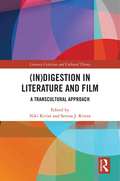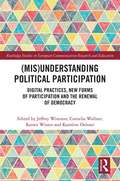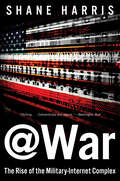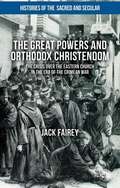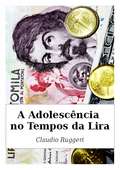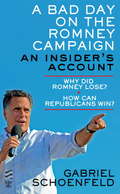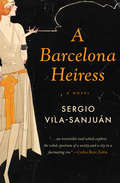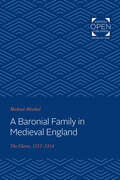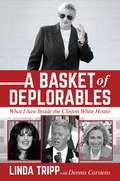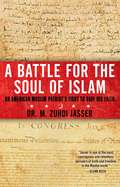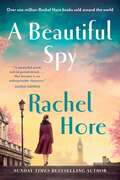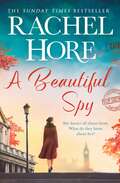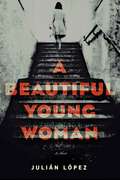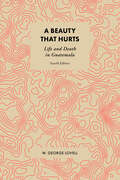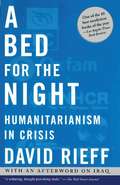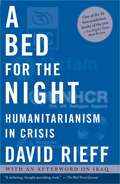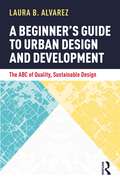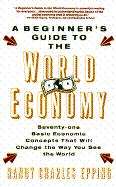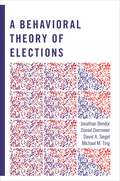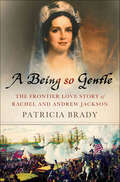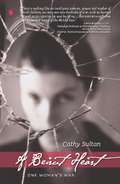- Table View
- List View
: A Transcultural Approach (Literary Criticism and Cultural Theory)
by Niki Kiviat(In)digestion in Literature and Film: A Transcultural Approach is a collection of essays spanning diverse geographic areas such as Brazil, Eastern Europe, France, Ireland, Italy, Japan, Mexico, South Korea, Taiwan and the United States. Despite this geographic variance, they all question disordered eating practices represented in literary and filmic works. The collection ultimately redefines disorder, removing the pathology and stigma assigned to acts of non-normative eating. In so doing, the essays deem taboo practices of food consumption, rejection and avoidance as expressions of resistance and defiance in the face of restrictive sociocultural, political, and economic normativities. As a result, disorder no longer equates to "out of order", implying a sense of brokenness, but is instead envisioned as an act against the dominant of order of operations. The collection therefore shifts critical focus from the eater as the embodiment of disorder to the problematic norms that defines behaviors as such.
: Digital Practices, New Forms of Participation and the Renewal of Democracy (Routledge Studies in European Communication Research and Education)
by Jeffrey Wimmer Cornelia Wallner Rainer Winter Karoline OelsnerThe practices of participation and engagement are characterised by complexities and contradictions. All celebratory examples of uses of social media, e.g. in the Arab spring, the Occupy movement or in recent LGBTQ protests, are deeply rooted in human practices. Because of this connection, every case of mediated participation should be perceived as highly contextual and cannot be attributed to one (social) specific media logic, necessitating detailed empirical studies to investigate the different contexts of political and civic engagement. In this volume, the theoretical chapters discuss analytical frameworks that can enrich our understanding of current contexts and practices of mediated participation. The empirical studies explore the implications of the new digital conditions for the ways in which digitally mediated social interactions, practices and environments shape everyday participation, engagement or protest and their subjective as well societal meaning.
@War: The Rise of the Military-Internet Complex
by Shane HarrisAn informative study of how corporations, governments, and individuals are perfecting the ability to monitor and sabotage Internet infrastructure.The wars of the future are already being fought today. The United States military currently views cyberspace as the “fifth domain” of warfare (alongside land, air, sea, and space), and the Department of Defense, the National Security Agency, and the CIA all field teams of hackers who can, and do, launch computer virus strikes against enemy targets. As recent revelations have shown, government agencies are joining with tech giants like Google and Facebook to collect vast amounts of information, and the military has also formed a new alliance with tech and finance companies to patrol cyberspace. Shane Harris offers a deeper glimpse into this partnership than we have ever seen before, and he explains what the new cyber security regime means for all of us who spend our daily lives bound to the Internet—and are vulnerable to its dangers.
A 'Macro-regional' Europe in the Making: Theoretical Approaches and Empirical Evidence (Palgrave Studies in European Union Politics)
by Stefan Gänzle Kristine KernMacro-regional strategies seek to improve the interplay of the EU with existing regimes and institutions, and foster coherence of transnational policies. Drawing on macro-regional governance and Europeanization, this edited volume provides an overview of processes of macro-regionalization in Europe displaying evidence of their significant impact.
A Adolescência No Tempos Da Lira
by Claudio Ruggeri Marily Santos de SouzaO encontro de dois amigos em uma tarde de verao, no qual o mais jovem escutarà as piadas e as estòrias do outro a respeito de um mundo que desapareceu hà alguns anos e que nào poderà existir outra vez, um mundo onde se escutava com muita frequencia a frase: " nao tenho uma Lira".
A Bad Day on the Romney Campaign
by Gabriel SchoenfeldWhy did Romney lose? How can Republicans win? In A Bad Day on the Romney Campaign, Gabriel Schoenfeld, a senior adviser to presidential nominee Mitt Romney for nearly two years, is the first insider to speak out about the failures of the 2012 campaign. Why did Romney lose? The book illuminates the chain of errors that ultimately contributed to Romney's defeat. Schoenfeld's original concept--zeroing in on a single gaffe on a single day: Romney's comments in the wake of the Benghazi attack, and examining its genesis and its profound ripple effects--makes for a uniquely fascinating contribution to our understanding of American politics and the challenges facing a Republican party that has lost the popular vote in five of the last six presidential races. Schoenfeld doesn’t shrink from pointing fingers and naming names. Unsparing in his criticism of some of his former colleagues, and candid in appraising Romney's strengths and weaknesses, his objective is to launch a far-reaching debate about how we choose America’s leader. With a revealing discussion of how Romney’s team formulated domestic and foreign policy, the book is a powerful voice in the ongoing discussion of the Republican Party’s future by a campaign insider who is also one of America’s leading analysts of public affairs. Written for Republicans, Democrats, and all Americans, rich with detail and high drama, it will interest anyone who wants a behind-the-scenes look at how our political system actually operates, with all its charms and all its flaws. Praise for Gabriel Schoenfeld’s Necessary Secrets: National Security, the Media, and the Rule of Law "Schoenfeld brilliantly illuminates [a] fundamental dilemma." --John McGinnis, Wall Street Journal “Essential reading for anyone seriously interested in national security and freedom of the press.” --Leonard Downie, Jr., Washington Post “Subtle and instructive.” --Alan Dershowitz, New York Times Book Review
A Barcelona Heiress
by Sergio Vila-SanjuánA historical detective story set against the social and political tumult of 1920s Barcelona and based on the real events of the end of a dazzling era. In the decade before the Spanish Civil War, Barcelona is on the verge of boiling over. Pablo Vilar, a well-connected young lawyer and journalist, meets several mysterious people who seem to hold clues to what is brewing in the city. The diverse cast of characters includes an assaulted cabaret artist, an anarchist leader, the city&’s new autocratic civil governor, and a beautiful, wealthy countess—their destinies all bound by invisible ties. While the city both touches its zenith and peers into the abyss, Vilar guides us through a labyrinth that leads from the caverns of Montjuïc, home to paupers and outlaws, to the high-society parties in the gardens of Horta. Based on documents from the author&’s family archives, and called &“an irresistible read&” by Carlos Ruiz Zafón, author of The Shadow of the Wind, A Barcelona Heiress provides a fresh perspective on a complex and dramatic period.
A Baronial Family in Medieval England: The Clares, 1217-1314 (The Johns Hopkins University Studies in Historical and Political Science)
by Michael AltschulOriginally published in 1965. In A Baronial Family in Medieval England: The Clares, 1217–1314, Michael Altschul studies the Clare family during the thirteenth century. The Clares spearheaded the struggle to enforce Magna Carta in the Barons' War. Historians prior to Altschul tended to neglect the Clares' history given the scattered nature of the archives documenting their time as a politically influential and powerful family. This book unfolds chronologically, outlining the Clares' rise to preeminence and describing how they administered their estates and income.
A Basket of Deplorables: What I Saw Inside the Clinton White House
by Linda TrippA compelling insider&’s look at a political marriage that tore apart the nation and almost destroyed a presidency—from the woman who saw it all happen.In this brilliantly written behind-the-scenes account, Linda Tripp along with her co-author, Dennis Carstens, shares her side of the Clinton White House sex scandals for the first time—detailing the behavior of two very flawed people who fooled a nation: Bill Clinton, a sexual predator, and his wife, Hillary, who was his primary enabler. In this exposé, Tripp outlines what the public was not allowed to see: the lengths Clintons&’ protectors would go to lie, deceive, and coverup for them; some of the many women Bill Clinton used his position, privilege, and power as president to sexually abuse; how the former president got away with it thanks to his morally bankrupt, unscrupulous wife and cabal of protectors; and finally, the role party politics played when he was called to task and was almost the first president to be removed from office for perjury and corruption.
A Battle Plan for Supporting Military Families: Lessons for the Leaders of Tomorrow (Risk and Resilience in Military and Veteran Families)
by David S. Riggs Linda Hughes-Kirchubel Shelley MacDermid WadsworthThis unique reference integrates knowledge culled from fifteen years of U. S. deployments to create an action plan for supporting military and veteran families during future conflicts. Its innovative ideas stretch beyond designated governmental agencies (e. g. , Department of Defense, VA) to include participation from, and possible collaborations with, the business/corporate, academic, advocacy, and philanthropic sectors. Contributors identify ongoing and emerging issues affecting military and veteran families and recommend specific strategies toward expanding and enhancing current programs and policy. This proactive agenda also outlines new directions for mobilizing the research community, featuring strategies for addressing institutional challenges and improving access to critical data. Included in the coverage: Lessons learned inside the Pentagon. Merging reintegration streams for veterans and military families. The unique role of professional associations in assisting military families: a case study. Philanthropy for military and veteran families: challenges past, recommendations for tomorrow. Rules of engagement: media coverage of military families during war. Designing and implementing strategic research studies to support military families. A Battle Plan for Supporting Military Families is of immediate usefulness to leaders, professionals, and future professionals in interdisciplinary academic, governmental, advocacy, and philanthropic areas of focus interested in the theoretical, practical, and real-life concerns and needs of military-affiliated families.
A Battle for the Soul of Islam
by M. Zuhdi JasserAmong the unsettling social shifts in the wake of 9/11 was the global attention paid to Islam. Here in the United States, we became divided, often sadly along partisan lines, between those who believed every Muslim was a potential threat and those who believed no Muslim could do wrong. For conservative Wisconsin native and former U.S. Navy Lieutenant Commander Dr. M. Zuhdi Jasser, these radical times meant facing a new reality as a devout Muslim and a patriot--a certain betrayal within his faith, and a need to answer a question that crossed the minds of even the most sensitive and politically correct: "Can a good Muslim be a good American as well?" Jasser founded the American Islamic Forum for Democracy (AIFD) to instill in young American Muslims an appreciation for the distinctively positive impact that this nation's ideals of liberty have had upon the world. As a nationally recognized expert on Muslim radicalization, he offers non-Muslims a definitive comprehension of the difference between Islam and the spiritual cancer known as Islamism, or political Islam, and how violence and extremism run counter to Islam's true teachings. As he persuasively argues, until we acknowledge the threat of Islamism in all its forms, the majority of Americans will be gulled into recognizing only the most obvious: terrorism. In A Battle for the Soul of Islam, Jasser embraces both his faith and his country while asking hard questions: * Are American Muslim children learning entitlement as victims, or are they being taught individual responsibility and critical thinking? * Are poisonous conspiracy theories dividing their American identity, or are they gaining exposure to reason, nationalism, and patriotism? * Are Muslims publicly critical of the Islamist movements of the Middle East, or do they remain silent on aspects of religious doctrine that conflict with modernity and universal equality? * Is the American press downplaying the seditious threat of homegrown Islamist radicalism and the influence of Islamists' propaganda arm on our governmental policies? * Is our culture of political correctness a major obstacle toward long-overdue Muslim reform against Islamism? All these years after 9/11, it's time for us to understand the true threat of Islamism. It is a Muslim problem that needs a Muslim solution, and A Battle for the Soul of Islam builds a solid, balanced, and imperative must-read foundation for the fight.
A Battle for the Soul of Islam: An American Muslim Patriot's Fight to Save His Faith
by M. Zuhdi JasserAmong the unsettling social shifts in the wake of 9/11 was the global attention paid to Islam. Here in the United States, we became divided, often sadly along partisan lines, between those who believed every Muslim was a potential threat and those who believed no Muslim could do wrong. For conservative Wisconsin native and former U.S. Navy Lieutenant Commander Dr. M. Zuhdi Jasser, these radical times meant facing a new reality as a devout Muslim and a patriot--a certain betrayal within his faith, and a need to answer a question that crossed the minds of even the most sensitive and politically correct: "Can a good Muslim be a good American as well?" Jasser founded the American Islamic Forum for Democracy (AIFD) to instill in young American Muslims an appreciation for the distinctively positive impact that this nation's ideals of liberty have had upon the world. As a nationally recognized expert on Muslim radicalization, he offers non-Muslims a definitive comprehension of the difference between Islam and the spiritual cancer known as Islamism, or political Islam, and how violence and extremism run counter to Islam's true teachings. As he persuasively argues, until we acknowledge the threat of Islamism in all its forms, the majority of Americans will be gulled into recognizing only the most obvious: terrorism. In A Battle for the Soul of Islam, Jasser embraces both his faith and his country while asking hard questions: * Are American Muslim children learning entitlement as victims, or are they being taught individual responsibility and critical thinking? * Are poisonous conspiracy theories dividing their American identity, or are they gaining exposure to reason, nationalism, and patriotism? * Are Muslims publicly critical of the Islamist movements of the Middle East, or do they remain silent on aspects of religious doctrine that conflict with modernity and universal equality? * Is the American press downplaying the seditious threat of homegrown Islamist radicalism and the influence of Islamists' propaganda arm on our governmental policies? * Is our culture of political correctness a major obstacle toward long-overdue Muslim reform against Islamism? All these years after 9/11, it's time for us to understand the true threat of Islamism. It is a Muslim problem that needs a Muslim solution, and A Battle for the Soul of Islam builds a solid, balanced, and imperative must-read foundation for the fight.
A Beautiful Spy: From The Million-copy Sunday Times Bestseller
by Rachel HoreFrom the million-copy Sunday Times bestseller comes a thrilling novel about a woman with an extraordinary life, based on a true story. 'Fantastic… Exciting, impeccably researched and full of powerful period atmosphere' Daily MailMinnie Gray is an ordinary young woman.She is also a spy for the British government. It all began in the summer of 1928... Minnie is supposed to find a nice man, get married and have children. The problem is it doesn&’t appeal to her at all. She is working as a secretary, but longs to make a difference. Then, one day, she gets her chance. She is recruited by the British government as a spy. Under strict instructions not to tell anyone, not even her family, she moves to London and begins her mission – to infiltrate the Communist movement. She soon gains the trust of important leaders. But as she grows more and more entangled in the workings of the movement, her job becomes increasingly dangerous. Leading a double life is starting to take its toll on her relationships and, feeling more isolated than ever, she starts to wonder how this is all going to end. The Russians are notorious for ruthlessly disposing of people given the slightest suspicion. What if they find out? Full of suspense, courage and love, A Beautiful Spy is a stunningly written story about resisting the norm and following your dreams, even if they come with sacrifices. 'Rachel Hore has written a masterful novel, rich in period detail, and her heroine is an unforgettable character' Sunday Express 'As far as her friends and family think, Minnie is an ordinary girl but she is a government spy – recruited to infiltrate the communist government. But how long can anyone lead a double life?' Best &‘Stunning. A masterclass in storytelling. Flawless writing and a great plot that builds suspense… I loved every moment&’ Dinah Jefferies, author of The Tuscan Contessa &‘Rachel Hore brilliantly contrasts the thrilling world of high-stakes politics with the inner life of a passionate woman leading a dangerous double existence&’ Wendy Holden, author of The Governess 'Phenomenal! Absolutely loved it. I was rooting for Minnie from page one right to the very end... What a treat of a read' Tracy Rees, author of The House at Silvermoor'A compulsive and enjoyable read' Historical Novel Society &‘Based on the life of Olga Gray, this atmospheric thriller is a delight to read&’ Sun 'Minnie Gray – on the outside an ordinary woman, inside a spy for the British Government who is asked to infiltrate the Russians' My Weekly
A Beautiful Spy: From the million-copy Sunday Times bestseller
by Rachel HoreFrom the million-copy Sunday Times bestseller comes a thrilling novel about a woman with an extraordinary life, based on a true story. 'Fantastic… Exciting, impeccably researched and full of powerful period atmosphere' Daily MailMinnie Gray is an ordinary young woman.She is also a spy for the British government. It all began in the summer of 1928... Minnie is supposed to find a nice man, get married and have children. The problem is it doesn&’t appeal to her at all. She is working as a secretary, but longs to make a difference. Then, one day, she gets her chance. She is recruited by the British government as a spy. Under strict instructions not to tell anyone, not even her family, she moves to London and begins her mission – to infiltrate the Communist movement. She soon gains the trust of important leaders. But as she grows more and more entangled in the workings of the movement, her job becomes increasingly dangerous. Leading a double life is starting to take its toll on her relationships and, feeling more isolated than ever, she starts to wonder how this is all going to end. The Russians are notorious for ruthlessly disposing of people given the slightest suspicion. What if they find out? Full of suspense, courage and love, A Beautiful Spy is a stunningly written story about resisting the norm and following your dreams, even if they come with sacrifices. &‘A superb novel. I absolutely loved it. Rachel Hore brilliantly contrasts the thrilling world of high-stakes politics with the inner life of a passionate woman leading a dangerous double existence&’ Wendy Holden, author of The Governess 'Phenomenal! Absolutely loved it. I was rooting for Minnie from page one right to the very end... What a treat of a read' Tracy Rees, author of The House at Silvermoor Praise for Rachel Hore: 'Absorbing&’ BARBARA ERSKINE &‘An emotive and thought-provoking read&’ ROSANNA LEY 'A poignant story, rich in period detail' SUNDAY MIRROR &‘Readers are sure to be engrossed and swept away' JANE JOHNSON 'Engrossing, pleasantly surprising and thoroughly readable' SANTA MONTEFIORE &‘Her women are brave and good and you desperately want them to win&’ DAILY MAIL &‘Rachel Hore's research and mastery of the subject is deeply impressive' JUDY FINNIGAN
A Beautiful Young Woman
by Julian Lopez“A moving story . . . powerful, celebratory, and loving.” —Laura Cardona, La NaciónSet in the midst of Argentina's military dictatorship, a poignant and evocative debut novel about family, political violence, and the consequences of dissidenceAs political violence escalates around them, a young boy and his single mother live together in an apartment in Buenos Aires—which has recently been taken over by Argentina’s military dictatorship. When the boy returns home one day to find his mother missing (or “disappeared”), the story fractures, and the reader encounters him fully grown, consumed by the burden of his loss, attempting to reconstruct the memory of his mother. By leaping forward in time, the boy—now a man—subtly gives shape to his mother’s activism, and in the process recasts the memories from his childhood. The result is a stylistically masterful and deeply moving novel marking the English-language debut of one of Argentina's most promising writers.
A Beauty that Hurts: Life and Death in Guatemala
by W. George LovellWhen A Beauty That Hurts first appeared in 1995, Guatemala was one of the world’s most flagrant violators of human rights. An accord brokered by the United Nations brought a measure of peace after three decades of armed conflict, but the country’s troubles are far from over. George Lovell revisits Guatemala to grapple once again with the terror inflicted on its Maya peoples by a military-dominated state.
A Bed for the Night
by David RieffTimely and controversial, A Bed for the Night reveals how humanitarian organizations trying to bring relief in an ever more violent and dangerous world are often betrayed and misused, and have increasingly lost sight of their purpose.Humanitarian relief workers, writes David Rieff, are the last of the just. And in the Bosnias, the Rwandas, and the Afghanistans of this world, humanitarianism remains the vocation of helping people when they most desperately need help, when they have lost or stand at risk of losing everything they have, including their lives.Although humanitarianism's accomplishments have been tremendous, including saving countless lives, the lesson of the past ten years of civil wars and ethnic cleansing is that it can do only so much to alleviate suffering. Aid workers have discovered that while trying to do good, their efforts may also cause harm.Drawing on firsthand reporting from hot war zones around the world -- Bosnia, Rwanda, Congo, Kosovo, Sudan, and most recently Afghanistan -- Rieff describes how the International Committee of the Red Cross, Doctors Without Borders, the International Rescue Committee, CARE, Oxfam, and other humanitarian organizations have moved from their founding principle of political neutrality, which gave them access to victims of wars, to encouraging the international community to take action to stop civil wars and ethnic cleansing. This advocacy has come at a high price. By calling for intervention -- whether by the United Nations or by "coalitions of the willing" -- humanitarian organizations risk being seen as taking sides in a conflict and thus jeopardizing their access to victims. And by overreaching, the humanitarian movement has allowed itself to be hijacked by the major powers, at times becoming a fig leaf for actions those powers wish to take for their own interests, or for the major powers' inaction. Rieff concludes that if humanitarian organizations are to do what they do best -- alleviate suffering -- they must reclaim their independence.Except for relief workers themselves, no one has looked at humanitarian action as seriously or as unflinchingly, or has had such unparalleled access to its inner workings, as Rieff, who has traveled and lived with aid workers over many years and four continents.A cogent, hard-hitting report from the front lines, A Bed for the Night shows what international aid organizations must do if they are to continue to care for the victims of humanitarian disasters.
A Bed for the Night: Humanitarianism in Crisis
by David RieffTimely and controversial, A Bed for the Night reveals how humanitarian organizations are often betrayed and misused, and have increasingly lost sight of their purpose. Drawing on firsthand reporting from war zones around the world, David Rieff shows us what aid workers do in the field and the growing gap between their noble ambitions and their actual capabilities for alleviating suffering. He describes how many humanitarian organizations have moved from their founding principle of neutrality, which gave them access to victims, to encouraging the international community to take action to stop civil wars and ethnic cleansing. By calling for intervention, humanitarian organizations risk being seen as taking sides in a conflict and thus jeopardizing their access to victims. And by overreaching, the humanitarian movement has allowed itself to be hijacked by the major powers. Rieff concludes that if humanitarian organizations are to do what they do best -- alleviate suffering -- they must reclaim their independence.
A Bed for the Night: Humanitarianism in Crisis
by David RieffTimely and controversial, A Bed for the Night reveals how humanitarian organizations trying to bring relief in an ever more violent and dangerous world are often betrayed and misused, and have increasingly lost sight of their purpose.Humanitarian relief workers, writes David Rieff, are the last of the just. And in the Bosnias, the Rwandas, and the Afghanistans of this world, humanitarianism remains the vocation of helping people when they most desperately need help, when they have lost or stand at risk of losing everything they have, including their lives.Although humanitarianism's accomplishments have been tremendous, including saving countless lives, the lesson of the past ten years of civil wars and ethnic cleansing is that it can do only so much to alleviate suffering. Aid workers have discovered that while trying to do good, their efforts may also cause harm.Drawing on firsthand reporting from hot war zones around the world -- Bosnia, Rwanda, Congo, Kosovo, Sudan, and most recently Afghanistan -- Rieff describes how the International Committee of the Red Cross, Doctors Without Borders, the International Rescue Committee, CARE, Oxfam, and other humanitarian organizations have moved from their founding principle of political neutrality, which gave them access to victims of wars, to encouraging the international community to take action to stop civil wars and ethnic cleansing. This advocacy has come at a high price. By calling for intervention -- whether by the United Nations or by "coalitions of the willing" -- humanitarian organizations risk being seen as taking sides in a conflict and thus jeopardizing their access to victims. And by overreaching, the humanitarian movement has allowed itself to be hijacked by the major powers, at times becoming a fig leaf for actions those powers wish to take for their own interests, or for the major powers' inaction. Rieff concludes that if humanitarian organizations are to do what they do best -- alleviate suffering -- they must reclaim their independence.Except for relief workers themselves, no one has looked at humanitarian action as seriously or as unflinchingly, or has had such unparalleled access to its inner workings, as Rieff, who has traveled and lived with aid workers over many years and four continents.A cogent, hard-hitting report from the front lines, A Bed for the Night shows what international aid organizations must do if they are to continue to care for the victims of humanitarian disasters.
A Bed of Red Flowers: In Search of My Afghanistan
by Nelofer PaziraWritten with compassion, intelligence and insight, A Bed of Red Flowers is a profoundly moving portrait of life under occupation and the unforgettable story of a family, a people and a country. "The picnic of the red flower" is a traditional time of celebration for Afghans. One of Nelofer Pazira's earliest memories is of people gathering in the countryside to admire the tulips and poppies carpeting the landscape. It is the mid-1970s, and her parents are building a future for themselves and their young children in the city of Kabul. But when Nelofer is just five the Communists take power and her father, a respected doctor, is imprisoned along with thousands of other Afghans. The following year, the Russians invade Afghanistan, which becomes a police state and the center of a bloody conflict between the Soviet army and American-backed mujahidin fighters. A climate of violence and fear reigns. For Nelofer, there is no choice but to grow up fast. At eleven, she and her friends throw stones at the Russian tanks that stir up dust and animosity in the streets of Kabul. As a teenager she joins a resistance group, hiding her gun from her parents. Her emotional refuge is her friendship with her classmate Dyana, with whom she shares a passion for poetry, dreams and a better life. After a decade of war, Nelofer's family escapes across the mountains to Pakistan and later to Canada, where she continues to write to Dyana. When her friend suddenly stops writing, Nelofer fears for Dyana's life. With lyrical, narrative prose, A Bed of Red Flowers movingly tells Pazira's haunting story, as well as Afghanistan's story as a nation.
A Beginner's Guide to Urban Design and Development: The ABC of Quality, Sustainable Design
by Laura B. AlvarezThis book provides invaluable guidance to all those with an interest in placemaking and the built environment, from those with no experience to those who have worked for many years in industry, illustrating key principles that will secure higher quality, more sustainable design in accessible, jargon-free language. The author explains the design process in a straightforward way, exploring the different roles and highlighting the opportunities and limitations different agencies have to influence design over the various stages of the process. Examples from the UK and worldwide look at how the system operates and how best practice can make a real difference on the ground. Case studies examine situations where quality or sustainability fell short – and how this could have been avoided. This book also showcases a variety of evaluation tools, explaining how they operate, and giving guidance on how to create project-specific tools to drive schemes forward. With community empowerment at its core, the book explains technical language and shares bountiful knowledge to broaden place democracy and make influencing design accessible to many, not just a few. This is a book that brings together all the various parties involved in shaping the built environment, demonstrating that collaboration and mutual understanding are key to achieving better quality, more sustainable design.
A Beginner's Guide to the World Economy: 71 Basic Economic Concepts that will Change the Way You See the World
by Randy Charles EppingFrom arbitrage to the IMF, from exchange rates to money laundering, a clear exposition of how the global economy works. Includes a glossary of terms.
A Behavioral Theory of Elections
by Jonathan Bendor Michael M. Ting Daniel Diermeier David A. SiegelMost theories of elections assume that voters and political actors are fully rational. While these formulations produce many insights, they also generate anomalies--most famously, about turnout. The rise of behavioral economics has posed new challenges to the premise of rationality. This groundbreaking book provides a behavioral theory of elections based on the notion that all actors--politicians as well as voters--are only boundedly rational. The theory posits learning via trial and error: actions that surpass an actor's aspiration level are more likely to be used in the future, while those that fall short are less likely to be tried later. Based on this idea of adaptation, the authors construct formal models of party competition, turnout, and voters' choices of candidates. These models predict substantial turnout levels, voters sorting into parties, and winning parties adopting centrist platforms. In multiparty elections, voters are able to coordinate vote choices on majority-preferred candidates, while all candidates garner significant vote shares. Overall, the behavioral theory and its models produce macroimplications consistent with the data on elections, and they use plausible microassumptions about the cognitive capacities of politicians and voters. A computational model accompanies the book and can be used as a tool for further research.
A Being So Gentle: The Frontier Love Story of Rachel and Andrew Jackson
by Patricia BradyThe forty-year love affair between Rachel and Andrew Jackson parallels a tumultuous period in American history. Andrew Jackson was at the forefront of the American revolution—but he never could have made it without the support of his wife. Beautiful, charismatic, and generous, Rachel Jackson had the courage to go against the mores of her times in the name of love. As the wife of a great general in wartime, she often found herself running their plantation alone and, a true heroine, she took in and raised children orphaned by the war. Like many great love stories, this one ends tragically when Rachel dies only a few weeks after Andrew is elected president. He moved into the White House alone and never remarried. Andrew and Rachel Jackson's devotion to one another is inspiring, and here, in Patricia Brady's vivid prose, their story of love and loss comes to life for the first time.
A Beirut Heart
by Cathy SultanA Beirut Heart is the unforgettable story of an American woman who lived amidst the Lebanese Civil War for eight years and through it all attempted to sustain a life with her Lebanese husband and two small children. It is a memoir that offers a unique illustration of the unsung heroes of war-the women who assume the awesome task of keeping the family united during wartime.The book tells the story of how Cathy Sultan moved with her family to Lebanon in 1969. For six years they led an ideal life experiencing the rich culture, exotic food and breathtaking landscape of the city located along the blue waters of the Mediterranean Sea.After the war began in 1975, their lives changed forever. Sultan recounts how she held the family together by comforting her children after bomb blasts and consoling her physician husband who spent his days treating wounded civilians. To keep sane, she used cooking as her tranquilizer.The unique narrative places us uncomfortably inside something we seldom consider-the domestic element of civil war-and leaves on the reader a permanent impression of the destroyed city and its resilient people.
